"LET THERE BE LIGHT" Ministries
EXAMINING OUR FAITH, part 15 quotes
1) “Examine yourselves, whether ye be in the faith; prove your own selves.” 2 Corinthians 13:5.
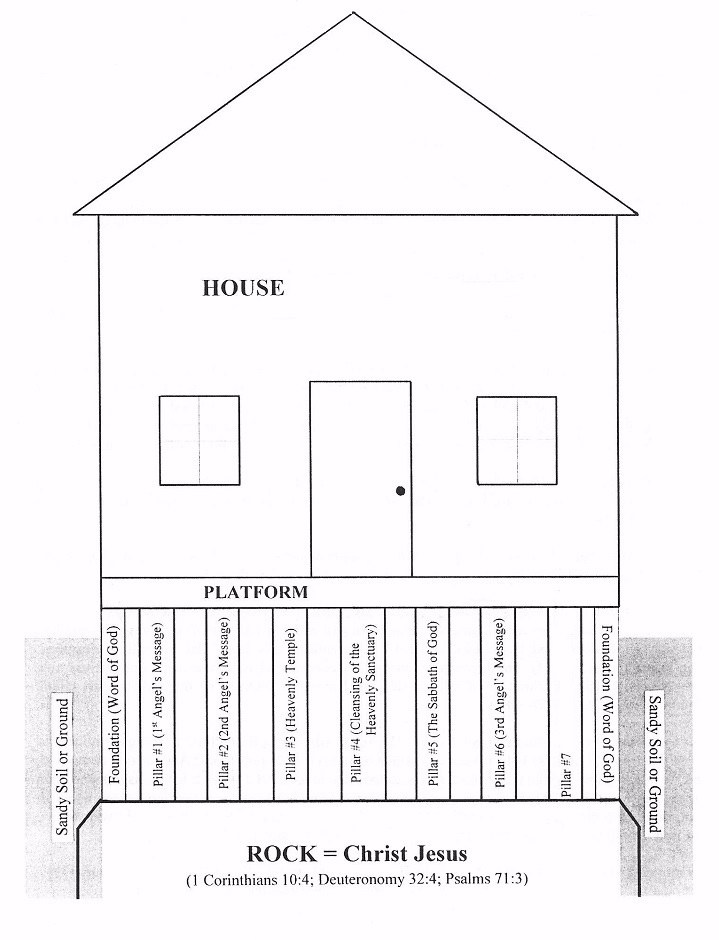
2) Characteristic #7. This Beast commits blasphemy against God, indicating that this Beast would claim to be worshiping only God, while actuality worshiping false gods; would claim to be able to forgive sins; and would also claim to be God on earth.
Idol Worship
Does the Roman Catholic Church claim to worship only God, but in actuality they worship false gods?
“Catholics kiss statues, bow down before them, and pray in front of them.” Catholic Answers from Catholic.com website at http://www.catholic.com/blog/tim-staples/so-catholics-worship-statues, accessed 8-18-16.
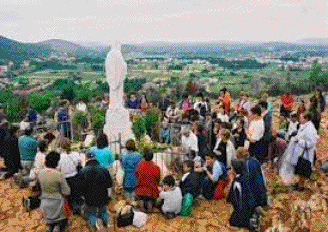 |
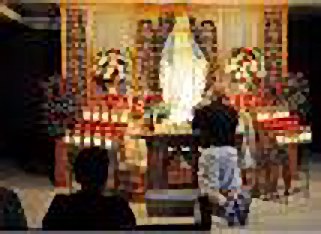 |
– Pictures of Catholics bowing to a statue or image
Not only do Catholic kiss, bow down and pray to statues and images, but some of these statues were originally pagan idols!
“The Pantheon is an ancient temple in Rome that was later converted into the Church of Santa Maria ad Martyres. Dating from 125 AD, this is the most complete ancient building in Rome. The Pantheon was dedicated to pan theos, meaning “all the gods.” When it became a Church, it was dedicated to the Virgin Mary and all the martyrs. The Pantheon is the burial place of several important Italians and it remains an active Church. The statues of the “gods” from the Pantheon are now found in the Vatican Museum with the exception of the great statue of Jupiter, which has been modified, re-titled, and seated on a throne in St. Peter’s Basilica in Rome as St. Peter. Thousands of pilgrims kiss the foot of Jupiter while thinking it is the statue of Peter”. The Jesuit-Vatican New World Order, by Alan Lamont, at http://vaticannewworldorder.blogspot.com/2012/02/great-pantheon-is-ancient-temple-in.html, accessed 8-18-16.
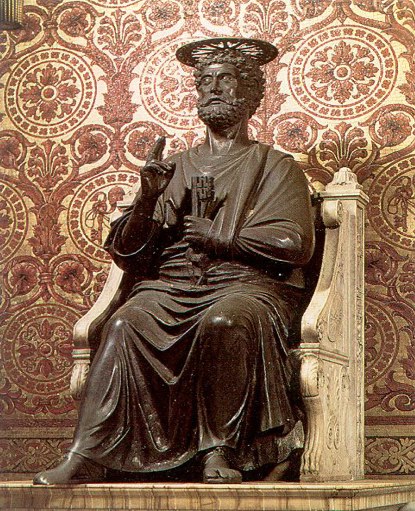 |
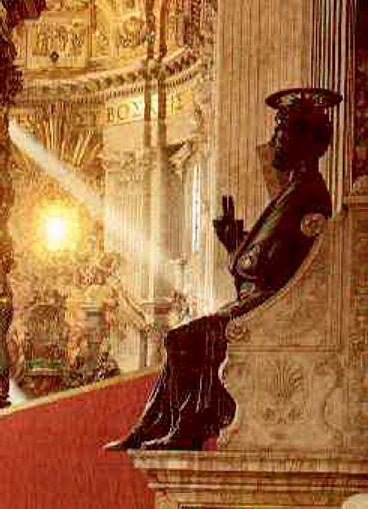 |
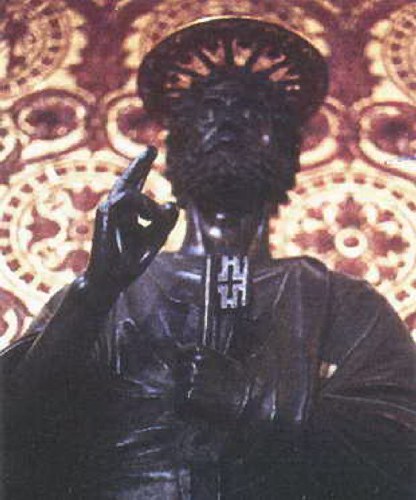 |
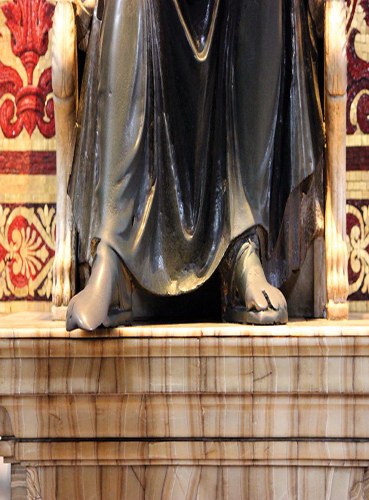 |
– Pictures of statue of Jupiter claimed to be St. Peter, with feet worn off from Catholics kissing and touching it.
– List of Idolatry within the Roman Catholic Church
3) Forgive Sins
Does the Roman Catholic Church claim to be able to forgive sins?
"The priest does really and truly forgive sins in virtue of the power given to him by Christ." Joseph Devarbe's Catechism, p. 279.
"And God himself is obliged to abide by the judgment of his priest and either not to pardon or to pardon, according as they refuse to give absolution, provided the penitent is capable of it." The Dignity of the Priesthood, p. 27, by St. Alphonsus De Liguori.
"Were the Redeemer to descend into a church, and sit in a confessional to administer the sacrament of penance, and a priest to sit in a confessional, Jesus would say over each penitent: 'Ego te absolvo,' the priest would likewise say over each of his penitents, 'Ego te absolvo,' and the penitents of each would be equally absolved." The Dignity of the Priesthood, p. 34, by St. Alphonsus De Liguori.
4) God on Earth
Does anyone in the Roman Catholic Church claim to be God on earth?
"...the power of the priest is the power of the divine person; for the transubstantiation of the bread requires as much power as the creation of the world....thus the priest may be called the creator of the Creator". The Dignity of the Priesthood, p 33, by St. Alphonsus De Liguori.
"Innocent III has written: 'Indeed, it is not too much to say that in view of the sublimity of their offices the priests are so many gods.'" The Dignity of the Priesthood, p 36, by St. Alphonsus De Liguori.
"Take care that we lose not that salvation, that life and breath which thou (the Pope) hast given us, for thou art our shepherd, thou art our physician, thou art our governor, thou art our husbandman, thou art finally another God on earth." Christopher Marcellus in Oration addressing Pope Julius II, in Fifth Lateran Council, Session IV (1512), Council Edition. Colm. Agrip. 1618, (Sacrorum Conciliorum, J.D. Mansi (ed.), Vol. 32, col. 761), (also quoted in History of the Councils, vol. XIV, col 109, by Labbe and Cossart).
"To believe that our Lord God the Pope has not the power to decree as he is decreed, is to be deemed heretical." The Gloss of Extravagantes of Pope John XXII, Cum. Inter, title 14, chapter 4, "Ad Callem Sexti Decretalium", Column 140, Paris, 1685. (In an Antwerp edition of the Extravagantes, the words, "Dominum Deum Nostrum Papam" (“Our Lord God the Pope” can be found in column 153).
"Those whom the Pope of Rome doth separate, it is not a man that separates them but God. For the Pope holdeth place on earth, not simply of a man but of the true God....dissolves, not by human but rather by divine authority....I am in all and above all, so that God Himself and I, the vicar of God, hath both one consistory, and I am able to do almost all that God can do...wherefore, if those things that I do be said not to be done of man, but of God, what do you make of me but God? Again, if prelates of the Church be called of Constantine for gods, I then being above all prelates, seem by this reason to be above all gods." Decretales Domini Gregori ix Translatione Episcoporum, (on the Transference of Bishops), title 7, chapter 3; Corpus Juris Canonice (2nd Leipzig ed., 1881), col. 99; (Paris, 1612), tom. 2, Decretales, col. 205 (while Innocent III was Pope).
"The Pope takes the place of Jesus Christ on earth...by divine right the Pope has supreme and full power in faith, in morals over each and every pastor and his flock. He is the true vicar, the head of the entire church, the father and teacher of all Christians. He is the infallible ruler, the founder of dogmas, the author of and the judge of councils; the universal ruler of truth, the arbiter of the world, the supreme judge of heaven and earth, the judge of all, being judged by no one, God himself on earth." Quoted in the New York Catechism.
"The Pope and God are the same, so he has all power in Heaven and earth." Pope Pius V, quoted in Barclay, Chapter XXVII, p. 218, "Cities Petrus Bertanous".
“...We hold upon this earth the place of God Almighty". Pope Leo XIII, in Praeclara Gratulationis Publicae (The Reunion of Christendom), Encyclical promulgated on June 20, 1894, at http://www.users.qwest.net/~slrorer/ReunionOfChristendom.htm, accessed 8-20-16.
“They have assumed infallibility, which belongs only to God. They profess to forgive sins, which belongs only to God. They profess to open and shut heaven, which belongs only to God. They profess to be higher than all the kings of the earth, which belongs only to God. And they go beyond God in pretending to loose whole nations from their oath of allegience to their kings, when such kings do not please them. And they go against God, when they give indulgences for sin. This is the worst of all blasphemies.” Adam Clarke, Commentary on Daniel 7:25, from The Holy Bible, Containing the Old and New Testaments, with a Commentary and Critical Notes, 1831 edition at http://www.sacred-texts.com/bib/cmt/clarke/dan007.htm, accessed 8-18-16.
5) Characteristic #8. This Beast makes war with and overcomes the saints, revealing that this Beast will persecute, war against and overcome those who obey God and Jesus Christ through faith and who also keep their commandments.
Did the Roman Catholic Church also make war with and persecute followers of God and Jesus Christ?
"There are many unquestionable cases of Protestants punished as heretics in nearly all the lands where Roman Catholics have had power, right down to the French Revolution [of 1798]." The Death-Penalty for Heresy, Medieval Studies, No. 18, p 62, by Catholic author G.G. Coulton, 1924 edition.
“The establishment of the Holy Office, or the Inquisition, as the persecuting arm of the Roman Church against all heretics. This effort accounted for the slaughter of 50 million martyrs over a period of about 300 years” The Other End of the World, p 127, by Roger Rusk, Plantation House, 1988.
“For professing faith contrary to the teachings of the Church of Rome, history records the martyrdom of more than one hundred million people. A million Waldenses and Albigenses perished during a crusade proclaimed by Pope Innocent III in 1208; beginning from the establishment of the Jesuits in 1540 to 1580, nine hundred thousand were destroyed; one hundred and fifty thousand perished by the Inquisition in 30 years; within the space of thirty-eight years after the edict of Charles V against Protestants, fifty thousand persons were hanged, beheaded, or burned alive for heresy; eighteen thousand more perished during the administration of the Duke of Alva in five and a half years.” 28 Brief Bible Readings for Busy People, No. 8 - The Prophecy of Daniel 7, note #4, from How To Give Bible Readings, p 97, 1930 edition.
“That the Church of Rome has shed more innocent blood than any other institution that has ever existed among mankind, will be questioned by no Protestant who has a competent knowledge of history....It is impossible to form a complete conception of the multitude of her victims, and it is quite certain that no powers of imagination can adequately realize their sufferings.” History of the Rise and Influence of the Spirit of Rationalism in Europe, vol 2, p 40, by W.E.H. Lecky, 1955 edition.
6) Characteristic #9. This Beasts rules for 42 months, indicating that since each month in Bible prophecy is exactly 30 days, so 42 months of 30 days each would mean that this Beast would rule over the known world for 1260 prophetic days. Also since each prophetic day represents 1 year of literal time, then this Beast is prophesied to rule over the world for 1260 literal years.
History confirms the fact that the papacy held supremacy for exactly 1260 years!
After the fall of the Roman Empire in 476 AD, the Roman Catholic sought to step into Rome’s place and rule over the same 10 nation/states of Western Europe that had supported Rome. But 3 of these nations – the Heruli, Vandals, and Ostrogoths – refused to yield to the Catholic religion and authority. Therefore the Catholic church made war against these three nations.
The Heruli were defeated in 493. In this midst of the remaining warfare against the other 2 rebel nation/states, the emperor over Eastern Europe - Justinian the Great - issued a decree in the year 533 recognizing the bishop of Rome as the “head of all the holy churches.”
“To Victorious, Pious, Happy, Renowned, Triumphant, always Augustus, to John, Patriarch, and most Holy Archbishop of the fair City of Rome:
“With honor to the Apostolic See, and to Your Holiness, which is, and always has been remembered in Our prayers, both now and formerly, and honoring your happiness, as is proper in the case of one who is considered as a father, We hasten to bring to the knowledge of Your Holiness everything relating to the condition of the Church...For we do not suffer anything which has reference to the state of the Church, even though what causes the difficulty may be clear and free from doubt, to be discussed without being brought to the notice of Your Holiness, because you are the head of all the Holy Churches, for We shall exert Ourselves in every way (as has already been stated), to increase the honor and authority of your See.” The Code of Justinian, letter from Emperor Justinian to Pope John II, March, 533, at http://www.constitution.org/sps/sps12.htm, accessed 8-19-16.
The Pope now had full ecclesiastical or religious power in Europe, but as long as the nation/states of the Vandals and the Ostrogoths opposed the Roman Catholic Church, she lacked full political power and thus could not rule as supreme.
In the year 534 the Vandals were defeated, and in March of the year 538 the Ostrogoths were overwhelmingly defeated and forced to leave Rome (see Wikipedia Online Encyclopedia, under Siege of Rome, at https://en.wikipedia.org/wiki/Siege_of_Rome_(537%E2%80%9338), accessed 8-19-16)!
With unchallenged ecclesiastical as well as now political authority, the Pope became the most powerful man in Western Europe. March of the year 538 therefore marks the beginning of the years of papal supremacy.
Just 2 months later, in the 3rd Council/Synod of Orleans in May of 538, the agricultural country labor which Constantine allowed to take place on sundays, was now outlawed by the Roman Catholic Church and all labor was prohibited under penalties–which included excommunication, and even death for repeated offenders.
“It is a Jewish superstition that it is unlawful to ride or drive on Sunday, or do anything for the decoration of house or person. But field labours are forbidden, so that people may be able to come to church and worship. If anyone acts otherwise, he is to be punished, not by the laity, but by the bishop.” History of the Councils of the Church, vol IV, p 208-209, by Bishop Charles Joseph von Hefele, D.D., Section #251, Third Synod at Orleans, A.D. 538, Canon #28, published by T. & T. Clark, Edinburgh, Scotland, 1895, at https://archive.org/stream/historyofcouncil04hefeuoft/historyofcouncil04hefeuoft_djvu.txt, accessed 8-19-16.
This marked the beginning of the period of papal persecution against all who opposed or who would not obey the Catholic Church, or its priests, or its doctrines in any way. This period became known as the "dark ages".
Papal persecution continued growing in intensity for many centuries. But on February 10, 1798, French general Berthier entered the city of Rome, proclaimed it to now be a Republic, took pope Pius VI prisoner and exiled him to France, and then Emperor Napoleon proclaimed there would be no more popes elected. These actions were a death blow to the Roman Catholic Church, and put an end to her supreme rule over Europe! Thus this year of 1798 marks the end of the years of papal supremacy (see Characteristics #5 & 6).
In order to see how many years the Roman Catholic Church supremely ruled over Western Europe, all we have to do is to subtract 538 from 1798. This amazingly totals exactly 1260 years! The Roman Catholic Church had indeed reigned supreme for 42 prophetic months which equaled exactly 1,260 literal years to the very month, from March of 538 to February of 1798!